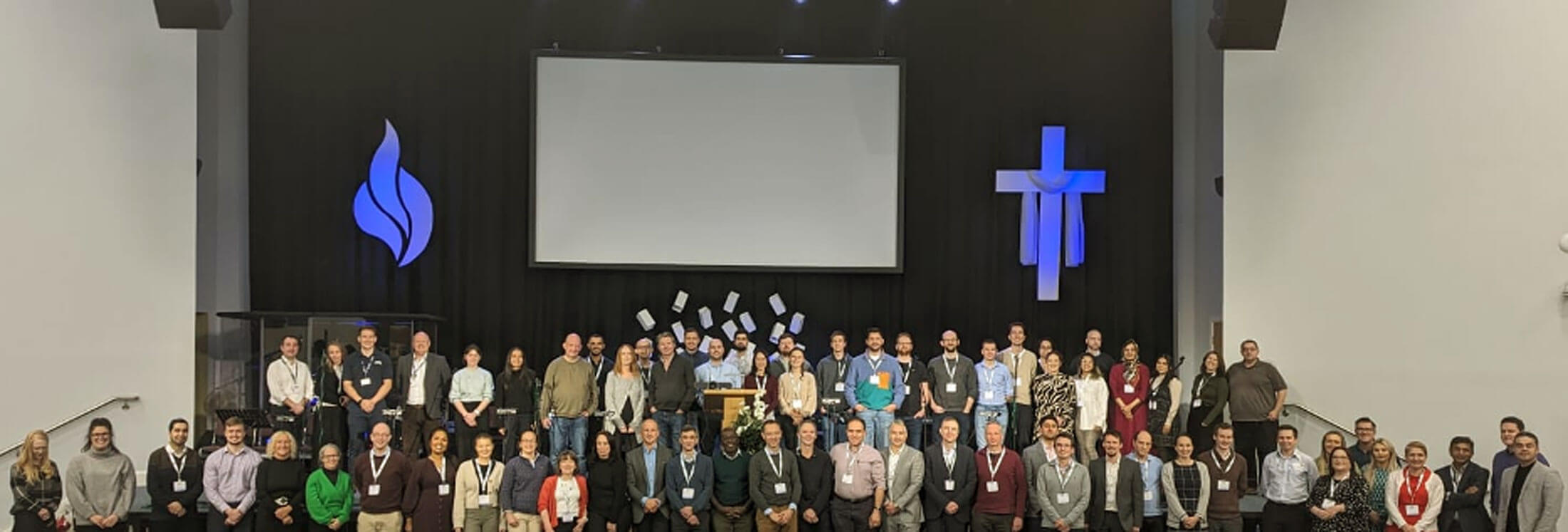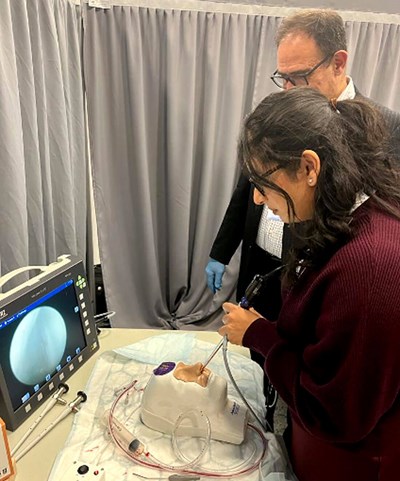

 Atia Khan (left), ENT Registrar, Royal Preston Hospital, North-West Trainee and Mr Raad John Glore (right), Consultant at Bradford Royal Infirmary.
Atia Khan (left), ENT Registrar, Royal Preston Hospital, North-West Trainee and Mr Raad John Glore (right), Consultant at Bradford Royal Infirmary.
The transition from a core surgical trainee to a newly appointed specialist otolaryngology trainee can seem like a Herculean task. That is why this accelerated learning course equips delegates with the aptitudes, skills and knowledge to commence their new post with confidence to convert a stressful new beginning to a smooth and structured one.
Trainees rotated around five themed stations over the two days: otology, rhinology, paediatric ENT, head and neck and a simulated ward round covering non-technical surgical skills. Mr Charles Hall, Vice-Chair of the specialist advisory committee for ENT at the Royal College of Surgeons, gave a presentation about ‘trainee matters’. Mr Francis Stafford, Clinical Lead of the Getting It Right First Time (GIRFT) ENT programme, updated us on his team’s most recent report. There was also an informative presentation about NHS pensions from Wesleyan Financial Services.
The otology stations covered mastoid drilling, set-up and technique, grommet and T-tube insertion, adult audiology techniques, interpretation and hearing aid provisions, balance assessment, interpreting temporal bone anatomy on CT, microscope skills and performing a cortical mastoidectomy using the Voxel-Man simulator.
 The rhinology station allowed delegates to practise theatre set-up for functional endoscopic sinus surgery (FESS), practise a polypectomy on model heads (kindly provided by Leeds Hospitals Charity) using a microdebrider, review paranasal sinus CT imaging, discuss rhinological emergencies such as orbital haematoma, septal haematoma, epistaxis and subperiosteal abscess. There was also an opportunity to cover clinical scenarios, with faculty providing the most up-to-date guidelines on allergic rhinitis and its impact on asthma (ARIA) and the European position paper on rhinosinusitis and nasal polyps (EPOS).
The rhinology station allowed delegates to practise theatre set-up for functional endoscopic sinus surgery (FESS), practise a polypectomy on model heads (kindly provided by Leeds Hospitals Charity) using a microdebrider, review paranasal sinus CT imaging, discuss rhinological emergencies such as orbital haematoma, septal haematoma, epistaxis and subperiosteal abscess. There was also an opportunity to cover clinical scenarios, with faculty providing the most up-to-date guidelines on allergic rhinitis and its impact on asthma (ARIA) and the European position paper on rhinosinusitis and nasal polyps (EPOS).
The paediatric ENT station provided the opportunity to perform a paediatric tracheostomy on rabbit cadavers, become familiar with the different paediatric tracheostomy tubes, practise coblation tonsillectomy and setting up and performing a microlaryngo-bronchoscopy on manikins to remove foreign bodies.
The head and neck station consisted of setting up suspension microlaryngoscopy and adult bronchoscopy. We also used channelled scopes to perform transnasal endoscopy and biopsy. A speech and language therapist provided practical guidance on managing laryngectomy stoma and voice rehabilitation. We discussed a simulation of a two-week wait clinic with feedback from the faculty. The non-technical skills stations (NOTTS) covered difficult real-life clinical and communication scenarios with professional actors who provided excellent feedback.
The two-day course was meticulously organised by Mr Justin Murphy and Mr James Moor (ENT consultants at Leeds Teaching Hospitals) who ensured the days ran seamlessly. The faculty-to-delegate ratio was 1:1 and all members of the faculty were approachable, supportive and knowledgeable. Socially, there was ample opportunity to meet trainees from all over the UK and network with trainers and industry sponsors who kindly provided delegates with suturing kits. The course ended with prizes for the delegate who shone in each station.
The feedback for the bootcamp was overwhelmingly positive. Delegates particularly enjoyed the variety of teaching platforms, including animal cadavers, manikins, and virtual and mixed reality. The course is highly valued among junior trainees and considered to be a must-attend by newly appointed registrars.
Above right: Atia Khan, ENT Registrar, Royal Preston Hospital, North West Trainee, pictured with Mr RJ Glore, Consultant at Bradford Royal Infirmary.



